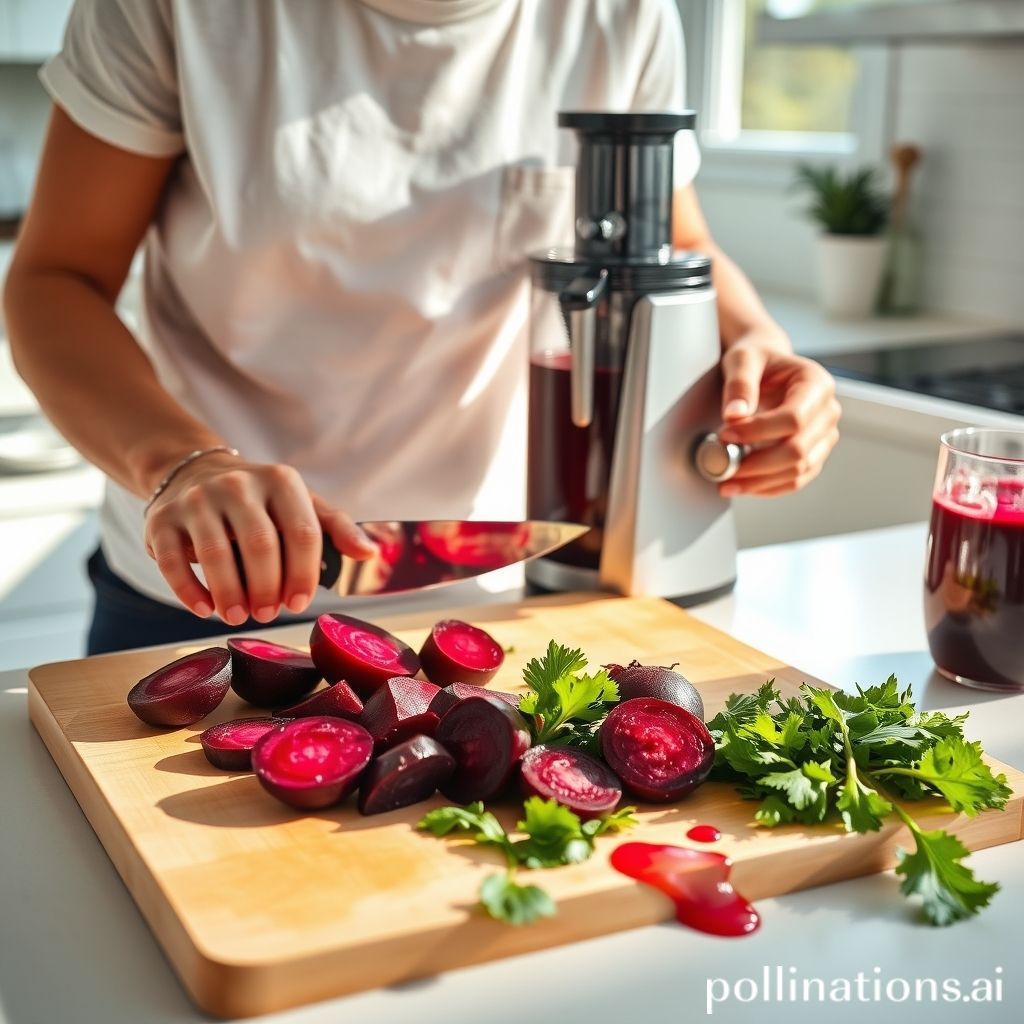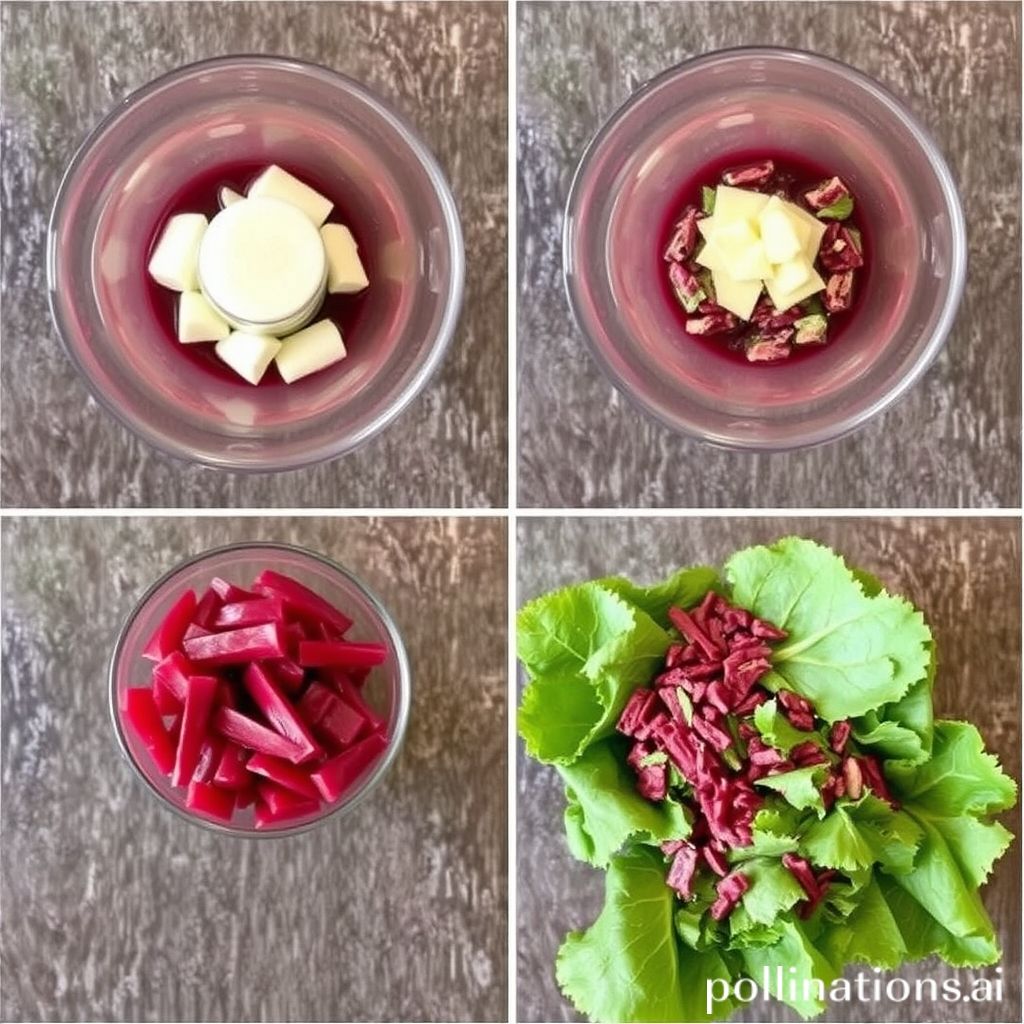How To Make Beet Juice Without A Juicer?
[su_note note_color=”#fb8e00″ text_color=”#000000″ radius=”12″]
Beet juice, a vibrant and refreshing drink, offers a multitude of health benefits. Whether you don’t own a juicer or simply prefer not to use one, making beet juice without a juicer is a simple and accessible process.
Don’t let the lack of a juicer discourage you from enjoying the nourishing goodness of this ruby red elixir. Homemade beet juice can be easily prepared using a blender or food processor, allowing you to reap the benefits of this nutrient-rich beverage. By obeying a juicer-free beet juice recipe, you can savor the natural sweetness and vibrant color of beet juice right in the comfort of your own home.
[su_box title=”
[/su_box]

Benefits of Beet Juice
1. Rich in Nutrients
Beet juice is packed with essential nutrients that contribute to overall health and well-being. It is a great source of vitamins such as vitamin C, vitamin A, and folate. It also contains minerals like potassium, iron, and manganese. These nutrients play a crucial role in supporting various bodily functions, including immune system function, energy production, and cell repair.
2. Boosts Stamina and Energy
If you want to enhance your stamina and energy levels naturally, beet juice is an excellent choice. The nitrates in beet juice increase blood flow and oxygen delivery to the muscles, which can improve exercise performance and reduce fatigue. Consuming beet juice before a workout or physical activity can help you push through intense training sessions and improve endurance.
3. Supports Detoxification
Beet juice contains compounds called betalains, which have detoxifying properties. These compounds support the body’s natural detoxification processes by helping eliminate toxins and waste products. Regularly drinking beet juice can aid in liver function and promote a healthy digestive system.
4. Improves Heart Health
Regular consumption of beet juice has been associated with numerous heart health benefits. The high levels of dietary nitrates in beet juice can help lower blood pressure, reduce the risk of cardiovascular diseases, and improve overall heart function. Beet juice also contains antioxidants that help reduce inflammation and oxidative stress, known risk factors for heart disease.
5. Enhances Brain Function
Beet juice contains natural nitrates that improve blood flow to the brain. This increased blood flow can enhance cognitive function, including memory, attention, and decision-making. Studies have shown potential benefits of beet juice for individuals with age-related cognitive decline or neurological disorders.
Incorporating beet juice into your diet can provide numerous health benefits, from increased nutrient intake to improved stamina and brain function. Whether you want to support your overall well-being or target specific health concerns, beet juice is a delicious and nutritious addition to your daily routine.
[su_highlight background=”#f6b40f”]Expert Tips: Boost your health with beet juice! It’s rich in nutrients, boosts stamina, supports detoxification, improves heart health, and enhances brain function. Incorporate it into your daily routine for optimal benefits.[/su_highlight]
Tools and Ingredients Needed
1. Beetroot
Beetroot is the main ingredient for making beet juice without a juicer. Choose fresh, firm, and vibrant-colored beetroots to ensure the best flavor and nutritional value.
2. Blender or Food Processor
A blender or food processor is essential for efficiently extracting the juice from the beetroot. Make sure your blender or food processor is in good working condition and has a strong motor to handle the blending process.
3. Cheesecloth or Fine-Mesh Strainer
To separate the juice from the pulp, you will need either a cheesecloth or a fine-mesh strainer. Using a cheesecloth or strainer will help remove any solid particles and ensure a smooth and clear beet juice.
4. Water
Water is required to dilute the beet juice and achieve the desired consistency. It is important to use clean and filtered water to maintain the purity of the juice.
| Tools and Ingredients |
|---|
| Beetroot |
| Blender or Food Processor |
| Cheesecloth or Fine-Mesh Strainer |
| Water |
By having these tools and ingredients ready, you can easily make delicious and nutritious beet juice without the need for a juicer. Just follow the simple steps and enjoy the benefits of homemade beet juice.
Preparation of Beet Juice
1. Wash and Peel the Beetroots
To start, make sure to wash the beetroots thoroughly under running water. This will remove any dirt or impurities. Once clean, use a vegetable peeler or a knife to peel off the outer skin of the beetroots. This step is important to ensure that your beet juice is free from any unwanted particles and to give it a smoother texture.
2. Chop the Beetroots into Small Pieces
After peeling the beetroots, proceed to chop them into small, manageable pieces. This will make it easier to blend them and ensure that they blend evenly. Try to aim for uniform-sized pieces to promote consistent blending.
3. Blend the Beetroots with Water
Now, place the chopped beetroots in a blender or food processor. Add an adequate amount of water to aid in the blending process. The exact amount of water you need may vary depending on your preferred consistency. Start with a small amount and gradually add more if necessary.
4. Strain the Blended Mixture
Once the beetroots are well blended, pour the mixture through a fine-mesh strainer or cheesecloth. This will separate the juice from any remaining solids or pulp. Gently press down on the solids to extract as much juice as possible. This step is crucial to achieve a smooth and pulp-free beet juice.
Now that you have successfully prepared your homemade beet juice without a juicer, you can enjoy its vibrant color, refreshing taste, and numerous health benefits. Feel free to experiment by adding other ingredients like lemon, ginger, or a touch of honey to enhance the flavor according to your preference. Cheers to your homemade beet juice!

Tips for Making Beet Juice Without a Juicer
1. Use a powerful blender or food processor
To make beet juice without a juicer, you can use a powerful blender or food processor. These appliances can effectively break down the beets and extract the juice. It’s advisable to chop the beets into smaller pieces before blending to ensure a smoother blending process.
2. Adjust the consistency with water
After blending the beets, you may find that the resulting juice is too thick. To achieve the desired consistency, gradually add water and blend again until you reach the desired texture. This step allows you to customize the thickness and taste of your beet juice according to your preference.
3. Experiment with flavors and additions
You can enhance the flavor of your homemade beet juice by experimenting with different flavors and additions. Consider adding a squeeze of lemon juice for a refreshing tang or a piece of ginger for added zest. Additionally, you can mix in other fruits or vegetables to create unique blends and discover new flavors.
4. Store the juice properly
Once you have made your beet juice, it’s important to store it properly to maintain its freshness and nutritional value. Transfer the juice into an airtight container and refrigerate it. It is recommended to consume the juice within 24-48 hours to ensure maximum flavor and benefits.
For added informational value, here’s a table summarizing the tips:
| Tips for Making Beet Juice Without a Juicer |
|---|
| Use a powerful blender or food processor |
| Adjust the consistency with water |
| Experiment with flavors and additions |
| Store the juice properly |
[su_note note_color=”#ea2e0c” text_color=”#ffffff” radius=”8″]Extra Tips: Get creative with flavors, chop beets into smaller pieces, and store juice in an airtight container for maximum freshness and benefits.[/su_note]
Variations and Additions
Beet juice is not only delicious but also packed with essential nutrients. At the same time using a juicer is the most common method to extract beet juice, you can still enjoy this vibrant beverage even without one. Here are some variations and additions to elevate your homemade beet juice:
1. Beet and Carrot Juice
Combining beets and carrots in your juice not only enhances the flavor but also adds a nutritional boost. Carrots are rich in antioxidants, vitamins, and minerals like beta-carotene, vitamin A, and potassium. By blending beets and carrots together, you create a powerhouse drink that promotes eye health, boosts immunity, and supports healthy skin.
2. Beet and Apple Juice
Adding apple to your beet juice not only adds natural sweetness but also helps balance the earthy taste of beets. Apples are a great source of fiber, antioxidants, and vitamin C. This combination results in a refreshing and tangy juice that aids digestion, supports cardiovascular health, and provides a natural energy boost.
3. Beet and Ginger Juice
For a zesty twist, try adding ginger to your beet juice. Ginger adds a spicy kick and offers a myriad of health benefits. It is known for its anti-inflammatory and antioxidant properties, which can help reduce muscle soreness, combat nausea, and support digestion. The combination of beets and ginger creates a vibrant and invigorating juice that is perfect for jumpstarting your day.
Conclusion
Making beet juice without a juicer is a simple and accessible process that allows you to enjoy the numerous health benefits of this vibrant drink. By abiding by the juicer-free beet juice recipe provided in this article, you can easily create homemade beet juice at home.
Whether you prefer a blender, food processor, or grater, these alternative methods ensure that you can incorporate beet juice into your diet without the need for a juicer. Experiment with different ingredients and flavors to customize your beet juice and enjoy its refreshing taste and nutritional advantages. Start incorporating this nutritious beverage into your daily routine and reap the benefits of beet juice without the need for a juicer.
FAQ about Making Beet Juice Without a Juicer
FAQ 1: Can I drink beet juice every day?
Yes, you can drink beet juice every day. Beet juice is packed with essential nutrients and antioxidants that can provide numerous health benefits when consumed regularly. Conversely, it is recommended to consult with your healthcare provider if you have any underlying health conditions or are taking medications.
FAQ 2: Can I use canned beets instead of fresh ones?
Yes, you can use canned beets to make beet juice. During fresh beets are generally preferred for their taste and nutritional value, canned beets can be a convenient alternative. Just ensure that the canned beets do not contain any added sugars or preservatives.
FAQ 3: How long does homemade beet juice last?
Homemade beet juice can typically last for about 3-4 days when stored in an airtight container in the refrigerator. It is best to consume the juice within this time frame to ensure freshness and maximum nutritional benefits.
FAQ 4: Can I freeze beet juice?
Yes, you can freeze beet juice for later use. Freezing beet juice can help extend its shelf life for up to 6 months. It is advisable to store the juice in freezer-safe containers, leaving some room for expansion, and thaw it in the refrigerator before consuming.
FAQ 5: Are there any side effects of drinking beet juice?
During beet juice is generally safe for consumption, it may cause some side effects in certain individuals. These may include temporary discoloration of urine or stool, digestive issues, and low blood pressure. It is always recommended to start with small amounts and monitor your body’s response. If you experience any adverse effects, discontinue use and consult a healthcare professional.
Read Similar Post:
1. The Shelf Life of Fresh Beet Juice: How Long Does It Last?
2. Preserving Homemade Beet Juice: The Ultimate Guide to Beet Juice Shelf Life
